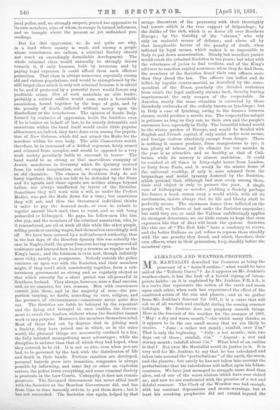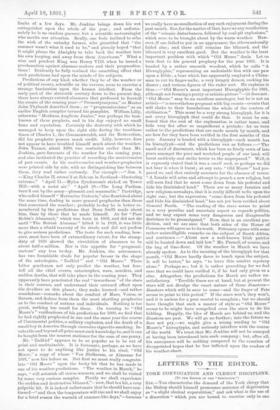ALMANACS AND WEATHER-PROPHETS.
MR. MANTALINI described his Countess as being the possessor of a " denan'd outline :" what would he have said of the "Telluric Curve" P As it appears on Mr. Jenkins's weather-chart, it has the look of a horrid zigzag, of intem- perate habits : as it is explained by Mr. Jenkins, F.R.A.S., it is a curve that represents the action of the earth and moon upon each other, when each has experienced the effect of the combined action of the sun and planets ; and as we gather from Mr. Jenkins's forecast for 1891, it is a curve that will rob us of all warmth and sunlight during the coming summer holidays. Mr. Jenkins does not prophesy smooth things. Here is the forecast of the weather for the summer of 1891. " May : a dry and warm month,"—for which many thanks, as it appears to be the one small mercy that we are likely to receive. " June : a rather wet month ; rainfall, over 2 in." That is only the beginning. " July : a wet month ; rain, two days out of three; rainfall, 4in." " August : a wet and stormy month ; rainfall about 5 in." What kind of an outline is that P Not even Mr. Mantalini could do justice to it. It is very well for Mr. Jenkins to say that he has calculated and taken into account the "perturbations" of the earth, the moon, and the planets ; but surely he has not taken into account the perturbations that his calculations will inflict upon his fellow- creatures. We have just managed to struggle, more dead than alive, out of one of the worst winters which have ever visited us ; and now we are confronted with the promise of a wet and doleful summer. The Clerk of the Weather was bad enough, with his constant depressions and storm-warnings, but at least his croaking prophecies did not extend beyond the
limits of a few days. Mr. Jenkins brings down his wet extinguisher upon the whole of the year ; and unfortu- nately he is no random guesser, but a scientific meteorologist who merits our attention. Really, one feels inclined to echo the wish of the unlucky farmer, who grumbled that " the summer wasn't what it used to be," and piously hoped " that it might please the Almighty to take back the weather into his own keeping, and away from them Americans." What a wise and prudent King was Henry VIII. when he issued a proclamation against almanac-makers and their prognostica- tions I Evidently he fully realised the unsettling effect that such predictions had upon the minds of his subjects.
Predictions of any kind, whether they be of the weather or 'of political events, scientific or the reverse, seem to exercise a strange fascination upon the human intellect. From the early part of the sixteenth century down to the present day, there have always existed almanacs that professed to foretell the events of the coming year—"Pronostycacyons," as Master John Thybault described them ; or " prognossicacions as an earlier English compiler termed his pamphlet. William Lilly, otherwise " Merlinus Anglicus Junior," was perhaps the best- known of these prophets, and in his day enjoyed no small fame and reputation. Certainly the dexterity with which he managed to keep upon the right side during the troublous times of Charles Is the Commonwealth, and the Restoration, "did his prophetic powers much credit. Lilly, however, does not appear to have troubled himself much about the weather. John Tanner, about 1690, two centuries earlier than Mr. Jenkins, gave forecasts of the weather for the coming year, and also instituted the practice of recording the anniversaries of past events. As his anniversaries and weather-prophecies were printed side by side, with no distinguishing line between -them, they read rather curiously. For example :—" Jan. 4. —King Charles II. crown's], at Schoon in Scotland—blustering extreme." " April 11.—Myles Syndereomb staked on Tower Hill—with a moist air." " April 20.—The Long Parliam. turn'd out by the army—pleasant and seasonable." Partridge, who called himself " Mercurius Ccolestis," also flourished about the same time, dealing in more general prophecies than those 'that concerned the weather ; probably to-day he is better re- membered by the predictions that Dean Swift made about him, than by those that he made himself. As for "Poor Robin's Almanack," which was born in 1663, and did not die -until " The British Almanac" killed it in 1828, it was little more than a ribald travesty of its rivals, and did not profess to give serious predictions. The taste for such reading, how- ever, must have been of extraordinary extent, for the stamp- duty of 1828 showed the circulation of almanacs to be about half.a.million. Nor is this appetite for " prognossi- epilons" any less to-day, Mr. Jenkins, the astronomer, has two formidable rivals for popular favour in the shape of the astrologists, " Zaslkiel " and " Old Moore." These latter gentlemen not only predict the weather, but fore. tell all the chief events, catastrophes, wars, murders, and sudden deaths, that will take place in the coming year. They apparently have penetrated the real " inwardness of the stars in their courses, and understand their outward effect upon the dwellers on this planet ; they make learned—and rather scandalous—remarks about the conduct of Mars, Venus, or Saturn, and deduce from them the most startling prophecies As to the conduct of nations and individuals, Nothing is too great, nothing too small for them, On turning to " Old Moore's " verifications of his predictions for 1890, we find that he had rightly prophesied in one and the same year the course -of Continental politics, a colliery explosion, and the death of a small boy in America through excessive cigarette-smoking. In- valuable and beyond all price must such knowledge be, and it can be bought from the nearest stationer for the sum of one penny.
Mr. " Zaclkiel" appears to be so popular as to be out of print and unobtainable. It is fortunate, perhaps, as we have mot space to do anything like justice to his rival, " Old Moore," a copy of whose Vox Stellarum, or Almanac for 1891," now lies before us. But first we must really congratu- late " Old Moore " upon the lucky bit that he has made in one of his weather-predictions. s The weather in March," he says, will astonish all storm-warners, and we shall be visited by some very curious samples. Firstly we shall experience the sudden and destructive blizzard,"—now, that is a bit, a very palpable hit. It is indeed unfortunate that he should have con- tinned—" and then the temperature will rise and we shall enjoy for a brief season the warmth of summer-like days,"—because we really have no recollection of any such enjoyment during the past month. Nor, for the matter of that, have we any recollection of the " seismic disturbances, followed by coal-pit explosions," which were to be brought about by the warm weather. How- ever, if one failed to put in an appearance, the others naturally failed also ; and there still remains the blizzard, and the blizzard is very excellent good. But the weather is the least important problem with which " Old Moore" deals. Let us turn first to his general. prophecy for the year 1891. It is headed by a rather uncouth woodcut, which he calls "A Hieroglyphic," representing an undeniable lion with one paw upon a Bible; a bear which has apparently employed a China- man to cut its finger-nails ; a very hungry demon, cooking his dinner ; and various figures of the ruder sort. He explains it thus :—" Old Moore's most important Hieroglyphic for 1891, although not forming a pretty or artistic picture "—(it does not :
Old Moore" may be an excellent astrologer, but he is not an artist)—" is nevertheless pregnant with big events—events that will shake to their foundations the whole of the centres of civilisation." This must he a very strong hieroglyph, for it is not every hieroglyph that could do that. It must be con- fessed that the rest of the explanation is rather tame, and falls very flat after so magnificent a prelude ; let us turn rather to the predictions that are made month by month, and see how far they have been verified in the first months of this year. January is headed with a hieroglyph—each month has its hieroglyph—and the predictions run as follows :—" The small seed of discontent, which has been so freely sown of late years amongst the poor and wretched people of our land, will burst suddenly and strike terror to the unprepared." Well, it is expressly stated that it was a small seed, so perhaps we did not hear it when it burst ; at any rate, " Old Moore" had pre- pared us, and that entirely accounts for the absence of terror. "A fanatic will arise and attempt to preach a new religion, but will soon find that he must come down from his pedestal and hide his diminished head." There are so many fanatics and new religions nowadays, that it is really difficult to fix upon the right one; but the expression, "come down from his pedestal and hide his diminished head," has not yet been verified about General Booth. "The reading of the stars seems to point to a very peculiar and uncertain aspect as regards politics, and we may expect some very dangerous and disagreeable doctrines to be promulgated." Now, that is an excellent pre- diction, and we are sure that both sides of the House of Commons will agree as to its truth. February opens with some rather unintelligible remarks on the subject of South Africa, and continues :—" About now a well-known Irish patriot will be hunted down and laid low." Mr. Parnell, of course, and the bag of lime-flour. Of the weather in March we have already spoken. As to the meaning of the hieroglyph for that month, " Old Moore hardly dares to touch upon. the subject. It will be better," he says, " to leave this sombre mystery alone." Perhaps so ; but it is rather provoking, for we feel sure that we could have verified it, if he had only given us a clue. Altogether, the predictions for March are rather un- satisfactory. Terrible times are at hand, but at present the stars will not divulge the exact nature of these disasters— disasters which will be sure to come—and the finger of Fate seems to point to this period." If the stars won't, they won't, and it is useless for a poor mortal to complain ; but we should have thought that such a master of style as Old Moore" seems to be might have compelled even the :Aare to do his bidding. Happily, the Ides of March are behind us, and the disasters are past. We will go no further; into the future we dare not pry,—we might give a wrong reading to "Old Moore's" hieroglyphs, and seriously interfere with the course of the world. We trust that Mr. Jenkins will not be annoyed at having been introduced into such company ; but, after all, his annoyance will be nothing compared to the vexation of disappointed hopes that he has inflicted upon the readers of his weather-chart.



































 Previous page
Previous page